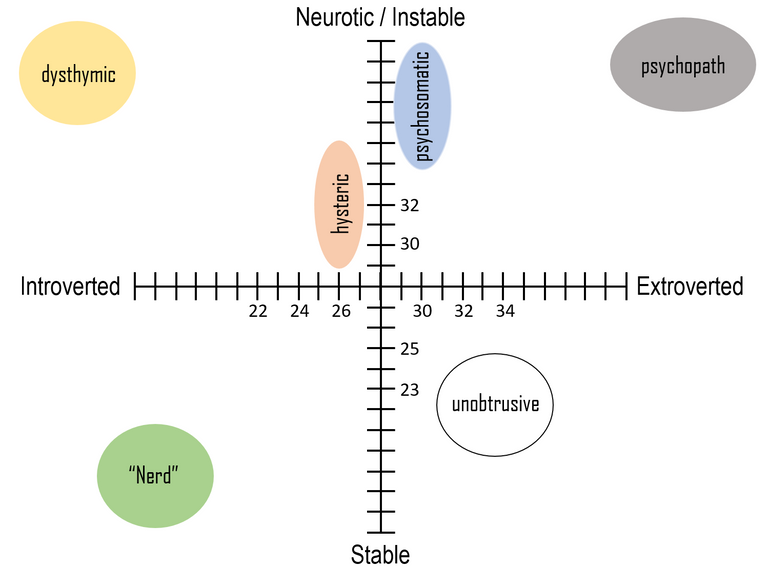Finally I found some time to prepare the translated #steemstem version of an interesting psychological placement test. - Shoutout to @ruth-girl! :)
For my standards this post revolves about something quite unusual:
The Psychology of Personality
Although I am quite interested in psychology, I can not boast any significant knowledge. Nevertheless, to mix things up I sometimes visit courses and lectures, which can be assigned to this scientific specialty. Lately I learned from a very multifaceted lecturer, who not only acts as a teacher at the university, but also has his own practice for psychotherapy and psychological counselling. In addition, he also works as a corporate psychologist and advises renowned companies in filling their key positions.
During this course we came across characteristic features of personality. Ultimately he even provided us with an old, psychological personality test (48 question including evaluation key). So anyone can test themselves and find out about his own personality. However we were told, that modern questionnaires are much more comprehensive (around 300 questions), sophisticated (include lie tests) and may not be made public with their key!

Quelle: pixabay
With this post I share such an old test with you. I will upload the key in a separate post tomorrow. But first of all I want to provide you with a bit of theoretical background, so that you know what you are testing exactly:
In modern psychology, the model of the psychologist Hans Jürgen Eysenck is often used for personality analysis. In this model, two main dimensions are differentiated:
Each of these characteristics is associated with typical attributes. It is rather intuitive, but to give you a better sense of the whole, here's a short overview:
Extraversion:
socially outgoing, convivial, communicative, does not like to be alone, loves excitement, willing to take risks, tends to aggression, impatient, likes to laugh, optimistic, not very reliable,...Introversion:
quiet, withdrawn, prone to self-observation, anticipating, careful, serious, wishes order, pessimistic, reliable,...Stable:
stable emotions, not easy to address, calm, balanced, reliable, carefree,...Neurotic:
labile emotions, easy to activate, demoralizing, sensitive, anxious, restless,...
The whole concept results in the following two-dimensional representative, virtual surface, which comprises all personlity types with their corresponding profile properties:

Within this model typical areas for known characteristic personality types can be found. These include psychopaths, psychosomatics, hysterics and dysthymics. But also areas for the classic image of a nerd or for someone generally socially unremarkable/unobtrusive can be classified.
Illustration self-made.
The areas marked in the graph have to be understood as indications with a natural spread rather than strictly restricted areas.
The Placement Test
Instructions:
The following 48 questions can each be answered with 'Yes', '?' or 'No'. Decide for yourself which of the answers best describes your usual way of acting or feeling. Only choose the question mark if you can not decide else. The less frequently you select it, the more meaningful the test result becomes. Write down the number of the question and your answer.
Answer the questions quickly. The test aims to capture the first immediate response, not the result of an extensive consideration. Answering the entire questionnaire should not take more than a few minutes (about 5 to 10 minutes). Be careful not to skip any questions.
Are you the happiest when you get involved in a task that requires swift action?
Are you sometimes for no reason alternately happy or sad?
Do your thoughts often wander around when you try to concentrate?
Do you usually make the first step when you gain new acquaintances/friends?
Do you usually act in a quick and safe manner?
Are you easily lost in thoughts while you should participate in a conversation?
Do you sometimes feel bursting with energy and sometimes slow and sluggish?
Do you consider yourself a lively person?
Would you be very unhappy if you had to forego frequent social contact?
Are you easily upset?
Does your mood often change with or without apparent reason?
Do you prefer making the plan or carrying out the plan?
Do you often daydream of things that are never realized?
Do you prefer to stay in the background at social events?
Do you ponder a lot about your past?
Is it difficult for you to come out of your shell, even in a relaxed society?
Do you sometimes have a miserable feeling for no reason?
Are you inclined to excessive conscientiousness?
Does it happen that you make a decision too late?
Do you enjoy the company of other people?
Do you often have sleepless nights due to excessive worries?
Do you like to limit your circle of acquaintances to a selected few?
Do you easily feel guilt?
Do you ever consider your work a deadly serious business?
Are your feelings easily hurt?
Do you enjoy to have many social duties?
Do you believe that you are particularly nervous and inwardly tense?
Do you like to take the lead in joint activities?
Do you often feel lonely?
Are you easily shy in the presence of the opposite sex?
Do you like to sink into reveries?
Do you almost always have an appropriate answer to comments addressed to you?
Do you think much about the good times you have had in the past?
Would you describe yourself as carefree?
Do you often have a feeling of indifference and tiredness, for no particular reason?
Do you tend to be silent in society?
After a tough and critical situation, do you usually think that you should have done something that you haven't done?
Can you usually be relaxed and carefree in a cheerful society?
Are you sometimes thinking in so many directions that you can not fall asleep?
Do you like work that requires a focus on detail?
Have you ever been bothered by useless thoughts that keep going through your mind?
Do you do your work as something habitual, self evident, nothing of particular interest?
Are you sensitive to some topics/habits/activites?
Do other people consider you vivacious?
Do you often have a bad, dissatisfied mood?
Do you refer to yourself as talkative?
Do you experience periods of such restlessness that you can not sit in a chair for long?
Do you like to play little pranks on other people?
I gave my best tu circumvent any language problems.
The evaluation key as well as some further explanations of the personality types highlighted above will follow in the next post. Until then: Do not lose the notes with your answers! :)
mountain.phil28
References:
- MPI Personality Placement Test, handed over by Prof. Enrique Grabl Dez. 2017
- H. J. Eysenck, The structure of human personality, 1970. London: Methuen.
Hans Eysenck contributed so much in T.O.P. (Theories of Personality). He argued that personality is genetically predetermined & highlighted the concepts of neuroticism. This is a great article given that you inserted a short personality test that's why it makes it more interesting. I even answered everything above and I will be keeping my notes. 🌸
Thanks for your comment. Seems like you are even more into this field of science than I am. :)
Only in a few hours the second part will go online, so stay tuned!
Best,
mountain.phil28
Whoah! Im excited 😉
Thank you @mountain.phil28!! You know I was waiting for the english version ;)
True, a couple of questions read weird but I have my answers noted down ready to compare them with your key :)
Jop, I knew and worried extensively (question 21.), because I was not able to provide you with the translation as fast as possible. :P I will now start to work on the key-including post. ;)
Yah, I am sorry for that. I am not a native speaker and these sentences are somehow twisted. :D
Nice post, learnt a lot.